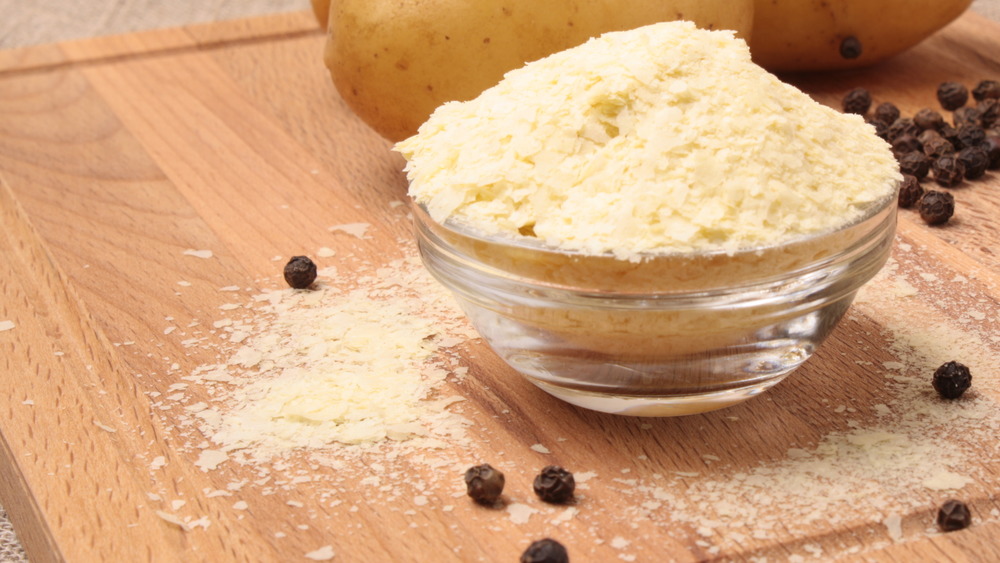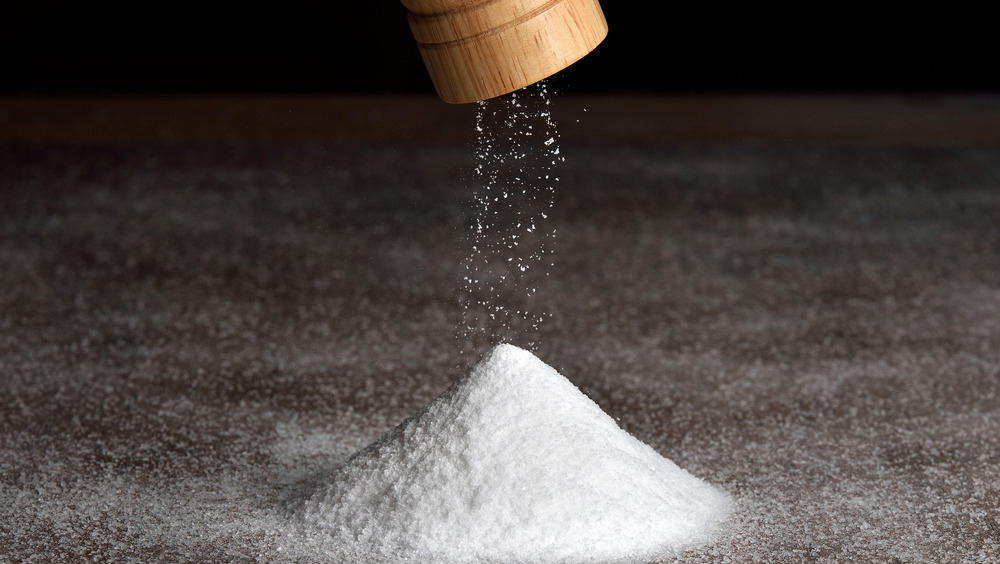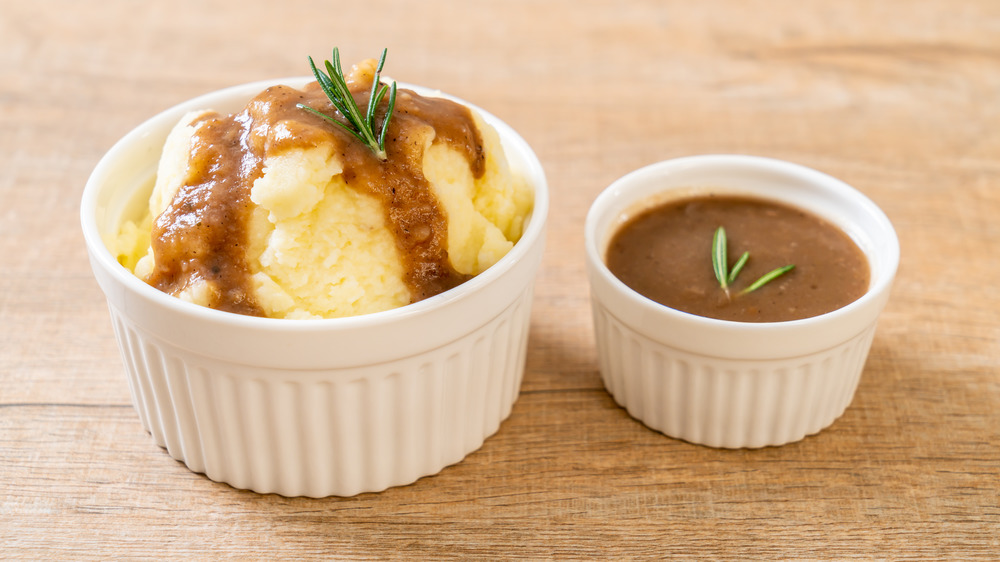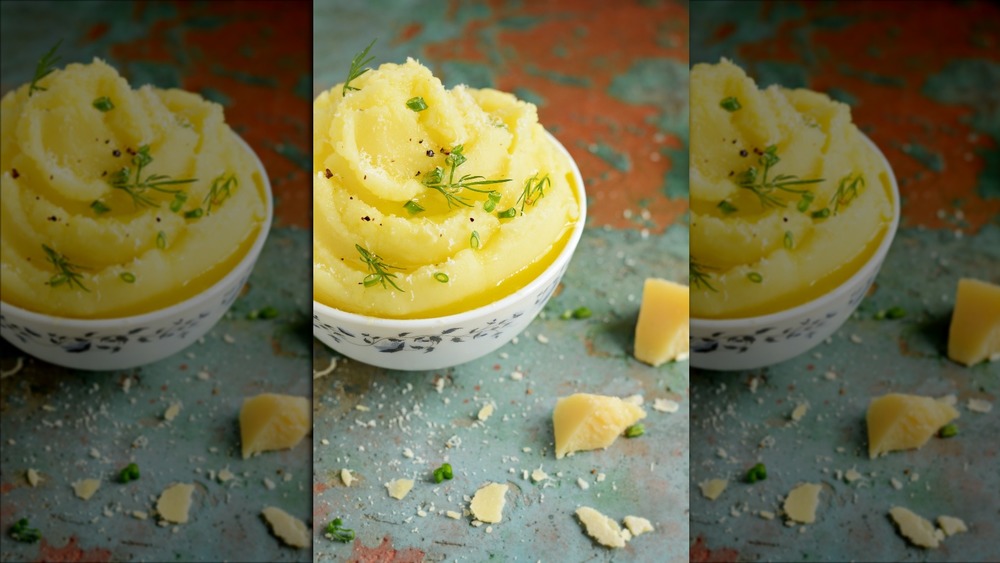Why You Should Think Twice Before Eating Instant Mashed Potatoes
Potatoes are the one vegetable that is almost universally beloved. Even confirmed veggie haters who would turn up their noses at plain baked or mashed potatoes will happily scarf down the latter two if they're loaded with tasty (although usually unhealthy) add-ons like bacon, cheese, sour cream, and chili (Wendy's knows this for a fact). Not to mention, there's hardly anybody who doesn't like French fries, except perhaps for those really sad ones produced by In-N-Out (not exactly fast food at its finest). In fact, when Taco Bell, a chain that's not even known for its fries, announced a plan to pull all potato-based items from its menu, this was met with howls of protest from an enraged internet. This is a level of devotion that kale can only dream of.
One of the best things about potatoes is their versatility. In addition to frying, baking, or mashing potatoes, you can also boil them, roast them, make them into hash browns or pancakes, turn them into soups and chowders, or even use them in cakes, cookies, and candies (yes, really). The one way you should not be eating your potatoes, according to nutritionist Lisa Richards, is in the form of the instant mashed kind. The author of The Candida Diet is no fan of this over-processed product, warning that, "Consumers should be wary of making these a common addition to their meals over whole potatoes."
Boxed mashed potatoes are too high in sodium
Richards reveals that instant mashed potatoes, like so many processed foods, are dangerously high in sodium. As she puts it, "The sodium content of boxed mashed potatoes should raise a red flag for all consumers." A single serving of just 1/3 cup of potatoes (the recommended serving size for most brands) contains about 440mg of sodium, which Richards tells us is nearly 25 percent of the maximum daily recommended amount (2,300 milligrams, according to the Food and Drug Administration). As Richards points out, "an additional concern here is that the serving of 1/3 of a cup is less than what most individuals will consume in a sitting," going on to say that "these potatoes will be seasoned further with salt and butter which will drive up the sodium content further."
While sodium is a necessary nutrient, there are a number of problems you might experience if you regularly consume excess amounts of it. One known side effect is high blood pressure. Other issues associated with high amounts of sodium include damage to the kidneys, heart, nervous system, and even the brain. While salting your mashed potatoes alone isn't likely to put you deep in the danger zone, still, it's best to keep an eye on your sodium intake.
Boxed mashed potatoes are higher in calories
Another area in which boxed mashed potatoes outdo (in a bad way) their less-processed counterpart is that of calorie content. As Richards tells us, "These potato alternatives pack over 200 calories into one cup, while a cup of whole potatoes is half that amount." Assuming you are limiting yourself to the recommended 1/3 cup serving, that's still 66 calories for instant mashed potatoes as opposed to only 33 calories for homemade mashed potatoes. Your calorie count will, of course, be higher if you make your mashed potatoes The Pioneer Woman way with a ton of butter and cream cheese, or add a bunch of mayo a la Snoop Dogg.
Another factor that Richards says is important to note is the calories' source: "Boxed potatoes," she tells us, "receive many of their calories from saturated fat, which whole potatoes offer very little fat at all. So yes, plain mashed potatoes would get the edge here, but again, no advantage if you succumb to the temptation to jazz them up with the aforementioned celebrity-endorsed add-ins or drown them in gravy the KFC way.
Boxed mashed potatoes don't have any calcium
One thing that non-instant mashed potatoes have that boxed ones lack is calcium, even if the amount in question is a fairly small one. Richards says that a cup of whole potatoes contains over six milligrams of calcium, and explains that "this micronutrient is important for bone health." She also tells us that it is "an especially important nutrient for those following a plant-based diet," especially one in which tubers play a significant part (as would likely be the case with vegetarians who eat a lot of fast food).
As the FDA recommends you consume 1,300 mg of calcium every single day, it's obvious that any form of potatoes on their own are never really going to be a significant source of this nutrient, unless, of course, you do dump in all that extra butter and cheese. Still, as Richards points out, "the same amount of boxed potatoes provides no calcium at all," so every little bit helps.
Instant mashed potatoes have some dubious additives
When you're eating a plain baked potato, or one that's been baked or boiled and then mashed, you're going to know exactly what it is that you're eating. This may even be the case if you've dressed up your potato with a bunch of toppings, healthy or otherwise — unless, perhaps, you are using bacon bits or any type of vegan meat or dairy substitutes, since those may also have a long list of hard-to-pronounce, harder-to-identify ingredients.
Richards offers the reminder that, with boxed mashed potatoes, you're really not getting this same reassurance of knowing just what you're eating, since "the list of additives and stabilizers to make these potatoes shelf stable and flavorful is longer than the list of vitamins and minerals they provide." What's more, she warns that one ingredient in particular, a non-organic bulking and stabilizing agent called silicoaluminate, is something she calls "potentially toxic."
So yes, boxed potatoes are quick, convenient, and a make heck of a soup thickener, but it's not really all that hard to make mashed potatoes from scratch either (and you can even freeze them for later use). And you know what the best part is? You no longer have to peel them! Omitting that step makes it just as easy to prepare your own potatoes, and you can dress them up any way you like them, confident in knowing that at least you're getting a few nutrients under all that butter and gravy.




